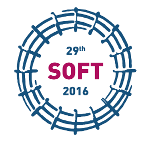Speaker
Marco Incelli
(DEIM)
Description
Pd-based membrane reactors are well-known technologies in the fuel cycle of the next fusion plants. In this work the application of Pd-Ag membranes have been studied in order to recover tritium in both molecular (Q2) and, especially, oxidised (Q2O) form in the tritium extraction system (TES) of the HCPB blanket.
The membrane reactor is made up of a Pd-Ag membrane tube filled with a catalyst. It allows to operate the permeation and chemical reaction in the same device as well as to reach higher reaction conversion and decontamination efficiency. Other advantages of such membrane modules are related to their high performances in terms of hydrogen permeability and selectivity, to their modularity (easy to scale up) and to their continuous operation (regeneration not required).
This kind of reactor is proposed for tritiated water decontamination through two types of reactions: Isotopic Swamping (IS) and Water Gas Shift (WGS).
In order to minimize the tritiated by-products (especially methane) and, at the same time, to promote the WGS or IS reactions, this work evaluates the performances of the membrane reactor for the two reactions (WGS and IS) under different operating conditions (temperature, pressure, concentration) by testing different catalysts. The tests results are reported in terms of decontamination factor (the amount of gaseous deuterium recovered from heavy water) by comparing the effectiveness of different catalysts. Especially, the capability of a new catalyst to minimize the formation of tritiated methane (by-product of the WGS) is tested.
Co-authors
Alessia Santucci
(ENEA for EUROfusion, Via E. Fermi 45, 00044 Frascati (Rome), Italy)
Marco Incelli
(DEIM, University of Tuscia, Via del Paradiso 47, 01100 Viterbo, Italy)
Maurizio Carlini
(DAFNE, University of Tuscia, Via San Camillo De Lellis, 01100 Viterbo, Italy)
Silvano Tosti
(ENEA for EUROfusion, Via E. Fermi 45, 00044 Frascati (Rome), Italy)

